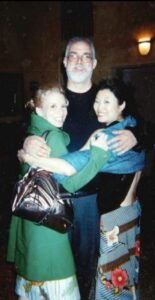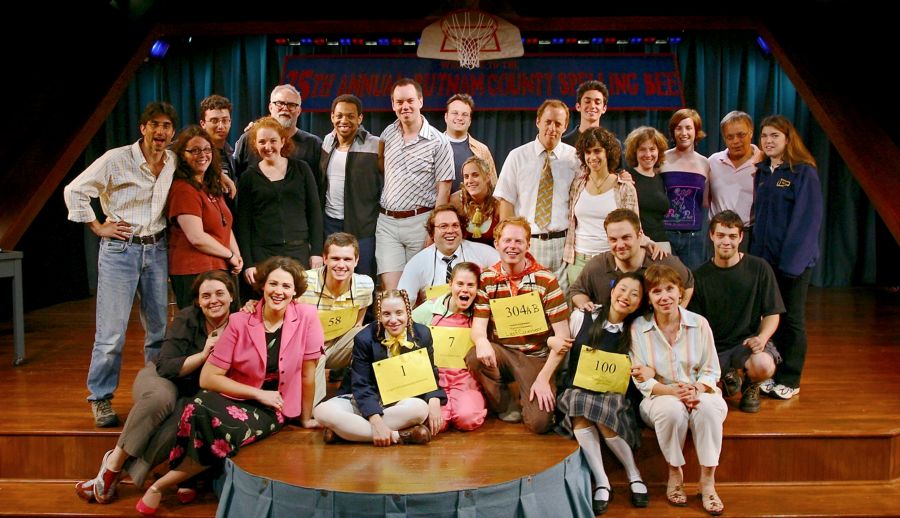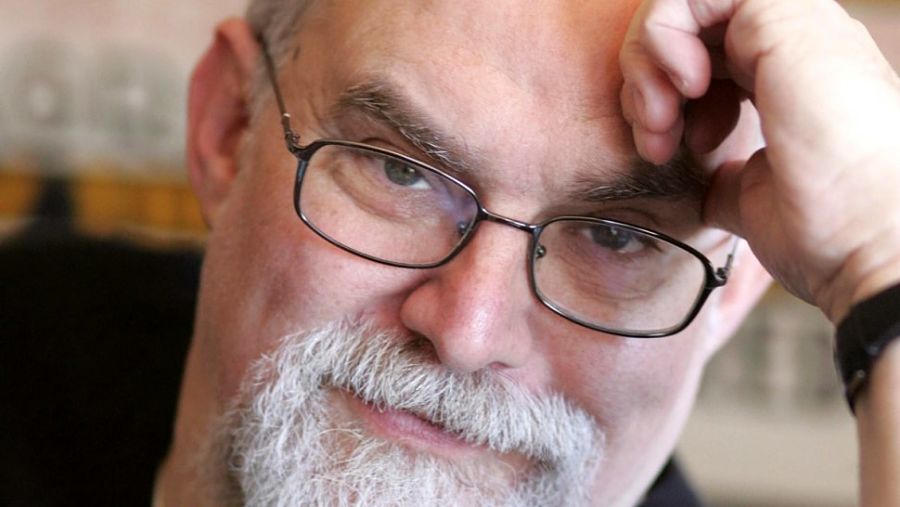Composer and lyricist William Finn, whose musicals included March of the Falsettos, A New Brain, and The 25th Annual Putnam County Spelling Bee, died on April 7. He was 73. For another tribute to him, go here.
I was working as a weekend nanny for Wendy Wasserstein when she generously came down to a leaky, rat-infested tinderbox of a theatre on the Lower East Side to see a show I created with some friends called C-R-E-P-U-S-C-U-L-E. (Theatre was so romantic in those days.) Afterward, I remember her saying, “This show is great—but you can’t end it with a recording of ‘Luck Be a Lady.’ I’m putting you in touch with my friend Bill, who teaches at NYU, and he can connect you with a student that might be interested in writing a score.”
I didn’t realize at the time that she was talking about the iconic, Tony Award-winning composer Bill Finn.
We met with Bill and showed him the tape of our show. He may have fallen asleep. But as the VCR clicked off, Bill looked up and said, “I’ll write the music.” That was it. No fanfare, no second meeting. And from that moment on, my life changed forever.
Creating what would become The 25th Annual Putnam County Spelling Bee with Bill was an absolutely magical time. It’s hard to put into words how exciting it was. For all his remarkable accomplishments, Bill was never intimidating—he could be opinionated and grumpy, but more often he was warm, playful, and collaborative. He also deeply understood the assignment. Bill not only saw our characters—tender, awkward, overachieving misfits trying to find their place—he saw himself in them. He recognized their quirks and quiet hopes. And when he wrote their songs, I think he wove pieces of himself into each one.
The first workshop of Spelling Bee was in February of 2004 at the Barrington Stage Company in the Berkshires. It was freezing and got dark at 3:30, and after rehearsals we would cook together and play running charades. It was great fun. Bill would bring in songs throughout the week, and each actor would be pulled into a side room to learn it. Days passed. Jesse got “I’m Not That Smart,” Deborah got “Six Languages,” Dan got “Magic Foot.”
Finally, it was my turn. I was ushered into the mysterious side room and presented with “Woe Is Me.” Bill barked out the entire song in one low, gravelly note. It was chaotic and wonderful, and I cried afterwards. (Later our vocal arranger, Carmel Dean, sang it and I realized: oh, there’s a melody!)
Hearing each of those songs day after day as he wrote and retooled them was having a front row seat to musical theatre greatness. At the time, none of us really had the perspective to understand what was happening, but we knew it was special. It wasn’t just that a legendary composer was writing songs for us, but we were creating a new piece of theatre together. In retrospect, developing Bee was a singular, formative experience that shaped so much of who we all became as performers and as people.

It wasn’t all sunshine and spontaneous harmonies. Creating a show is hard. We fought, we sobbed, there were several small nervous breakdowns. Each one of us felt passionately about the show and had a shared obsession with making it a success—but we didn’t always agree on what that looked like. Scenes were improvised endlessly, the script was constantly revised, and we often experimented with alternate endings. (One day, our writer Rachel Shenkein had my character Logainne winning the Bee—which was thrilling for me, but wasn’t right.) Several wonderful songs that Bill wrote never made it into the show. There were many joyful moments, and plenty of heartbreaking ones too. Through it all we hung onto each other for dear life as we got through the series of presentations that kept us moving, unknowingly, towards Broadway.
I was still nannying for Wendy on the weekends before we started rehearsals in our first New York home, Off-Broadway’s Second Stage. Wendy often talked about her “chosen family,” and I imagine she counted Bill as one of her siblings. He would come over for Shabbat dinner, and we’d order Shun Lee and sit at the fancy dining room table that overlooked Central Park. There were many, many nights where I would say to myself What is the life you are living? as I passed Bill another spare rib and listened to him and Wendy talk about their week, their mothers, the latest Broadway opening and how much they didn’t like it. Their connection was deep and lived-in. I thought then, and still think now, about how Spelling Bee came into the world as a result of their friendship and willingness to share so much of themselves.
Once the show moved in winter 2005 to Second Stage, Bill’s relationship with his longtime friend and collaborator, director James Lapine, became a mirror for the friendships we were building during this process. Wendy said it was one group of older friends and artists—herself, Bill, and James—ushering in and lifting up the next generation of friends and artists. By the time we began previews on Broadway in April 2005 (a month after our run at Second Stage, and just over a year since our first workshop), we had become a family, forged through the intense, euphoric, and terrifying process of creating an entirely new musical together.
Looking back 20 years later, what I hold most dear—beyond the joy the show has brought to audiences around the world—are the relationships that grew out of it. There’s a particular intimacy that comes from making something from nothing together. It binds and changes you. The process was transformative, and it gave us something lasting. We’ve celebrated marriages, welcomed babies, cheered each other on through new projects and adventures. And we’ve held each other through deep grief and loss.
When the news came that Bill had passed, the first people I turned to were those friends, my Bee family. It was a bittersweet comfort, and I was reminded again of how fortunate we all were to have known him. I will forever be grateful that he brought us together and remain in awe of how he made our show sing. I like to imagine him and Wendy now, sharing a plate of spare ribs, catching up and laughing about everything like no time has passed. Two friends, in their own corner of the universe, picking up the conversation right where they left off—full of wit, warmth, and the kind of connection that shaped all of us who were lucky enough to be in their orbit.
Love you, Bill. Thank you for everything. Good Bee.
Sarah Saltzberg originated the role of Logainne Schwartzandgrubenierre in the original C-R-E-P-U-S-C-U-L-E and in The 25th Annual Putnam County Spelling Bee.
Support American Theatre: a just and thriving theatre ecology begins with information for all. Please join us in this mission by joining TCG, which entitles you to copies of our quarterly print magazine and helps support a long legacy of quality nonprofit arts journalism.





